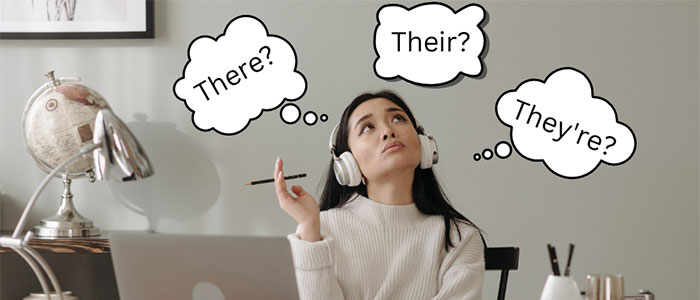
It’s one of the most common questions learners ask when studying English as a Second Language. When do you use there, their and they’re? While it seems like a simple enough question, it’s one that often has people stumped. The answer is actually pretty simple once you know the difference between these three words. In this blog post, we’ll explore when to use each one so that you can avoid any confusion when using these words.
What is the Difference Between There, Their and They’re?
There, their and they’re are all pronounced the same, but have different meanings and functions in a sentence.
- “There” refers to a place, as in “over there.”
- “Their” is the possessive form of they, as in “that’s their cat.”
- “They’re” is a contraction of “they are”, as in “they’re going to the store.”
Examples of When to Use There, Their and They’re
When deciding whether to use “there,” “their” or “they’re,” you must first identify the function of the word in the sentence. “There” is used as a pronoun meaning “that place”; “their” is a pronoun meaning “belonging to them”; and “they’re” is a contraction for “they are.” Below are some examples of when to use each word.
When to Use “There”
When referring to a location, use “there”.
- There is a great view from the top of the hill.
- I left my wallet over there.
- Paula is standing there while waiting for the bus.
When to Use “Their”
When indicating possession, use “their”.
- Their house is on fire!
- They have a lot of money in their bank accounts.
- Their bedrooms are clean.
When to Use “They’re”
Saying “they’re” is the same as “they are”.
- They’re going to be late for their own party.
- I did not say that they’re bad people.
- They’re very generous people.
Practice Exercises
Choose the correct word to use for each sentence. The answer key is in the next section.
- Put your bags over [there, their, they’re].
- I can’t find my keys. Can you check if I left them [there, their, they’re]?
- [There, Their, They’re] not the best people for the job.
- [There, Their, They’re] lives are at risk for taking on that job.
- The party is over [there, their, they’re] by the beach.
- [There, Their, They’re] crazy for thinking they can finish the job in one day.
- The cats like going to [there, their, they’re] yard.
- [There, Their, They’re] car has been stolen in broad daylight.
- I’m afraid [there, their, they’re] isn’t any food left.
- [There, Their, They’re] afraid of the rabid dog.
Answer Key
Click below to see the correct answers.
Click here to reveal the answers
- there
- there
- they’re
- their
- there
- they’re
- their
- their
- there
- they’re
How well did you do?
If you need help, you can book a trial lesson with us.
Leave a Reply